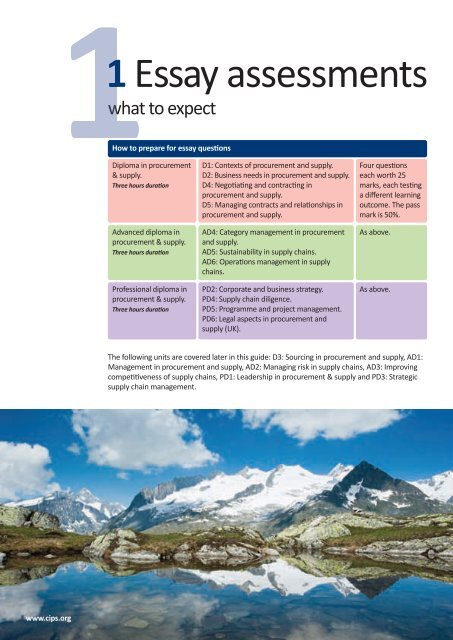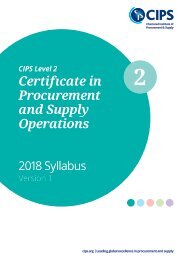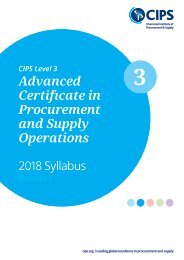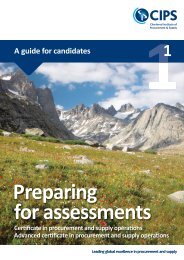Preparing for CIPS Diploma level assessments
Create successful ePaper yourself
Turn your PDF publications into a flip-book with our unique Google optimized e-Paper software.
1 Essay <strong>assessments</strong><br />
what to expect<br />
Essay-style questions<br />
preparation guide<br />
How to prepare <strong>for</strong> essay questions<br />
<strong>Diploma</strong> in procurement<br />
& supply.<br />
Three hours duration<br />
Advanced diploma in<br />
procurement & supply.<br />
Three hours duration<br />
Professional diploma in<br />
procurement & supply.<br />
Three hours duration<br />
D1: Contexts of procurement and supply.<br />
D2: Business needs in procurement and supply.<br />
D4: Negotiating and contracting in<br />
procurement and supply.<br />
D5: Managing contracts and relationships in<br />
procurement and supply.<br />
AD4: Category management in procurement<br />
and supply.<br />
AD5: Sustainability in supply chains.<br />
AD6: Operations management in supply<br />
chains.<br />
PD2: Corporate and business strategy.<br />
PD4: Supply chain diligence.<br />
PD5: Programme and project management.<br />
PD6: Legal aspects in procurement and<br />
supply (UK).<br />
Four questions<br />
each worth 25<br />
marks, each testing<br />
a different learning<br />
outcome. The pass<br />
mark is 50%.<br />
As above.<br />
As above.<br />
The following units are covered later in this guide: D3: Sourcing in procurement and supply, AD1:<br />
Management in procurement and supply, AD2: Managing risk in supply chains, AD3: Improving<br />
competitiveness of supply chains, PD1: Leadership in procurement & supply and PD3: Strategic<br />
supply chain management.<br />
Timing is everything<br />
• Spend 5 minutes reading the instructions and<br />
questions through at least twice – it is worth<br />
reading all the questions on the paper so that<br />
you have an overall picture of what is being<br />
asked, be<strong>for</strong>e you focus attention on each of the<br />
questions some of which may have several<br />
parts. This is so that you can make sure that you<br />
have established the focus of each question, and<br />
avoid straying into material that you might need<br />
to use in other questions. Some questions may<br />
contain a brief scenario or a contextual<br />
statement, probably only two or three lines<br />
long. This is not a case study, which would be<br />
considerably longer<br />
• You will need to decide how to allocate your time<br />
<strong>for</strong> each question. At the end of this section you<br />
will find a table that gives you some<br />
recommended timings <strong>for</strong> answering essay<br />
questions. Be ready to stop writing the essay<br />
when your allocated time runs out! If you do not<br />
move on to the next question, you are likely to run<br />
out of time and fail to gain marks overall. If you are<br />
struggling with completing your first and second<br />
essays in the time you have allocated, then you<br />
will need to review your plans <strong>for</strong> the other<br />
questions, in order to make sure you complete as<br />
many answers to questions as possible.<br />
Reading the questions and planning<br />
your answers<br />
• As you read through the paper, identify what is<br />
being asked of you in each question. Remember,<br />
there will be one question <strong>for</strong> each of the<br />
learning outcomes from the Unit Content Guide:<br />
Determine which part of the subject unit<br />
content the question relates to<br />
Consider what key issues the question is asking<br />
you to write about, so that you are sure you<br />
fully understand the demands of the question.<br />
Format, context, task and outputs are very<br />
important<br />
Check the number of marks allocated to each<br />
question or part of a question: this helps you to<br />
work out how much in<strong>for</strong>mation the assessors<br />
are expecting you to include in your answer to<br />
each part<br />
Take careful note if the question asks you to<br />
provide a specific number of examples or<br />
ideas – make sure you provide the number<br />
required.<br />
Example<br />
Discuss FOUR advantages and FOUR disadvantages of a winlose<br />
approach to negotiation. (16 marks).<br />
Make sure you give four of each, no less. Two marks are<br />
allocated <strong>for</strong> each one, so you cannot earn marks if you do not<br />
provide the required number, no matter how detailed your<br />
discussion may be of the advantages/ disadvantages you include.<br />
• Next, highlight the command words in each<br />
question or part of a question. (See General<br />
advice <strong>for</strong> preparing <strong>for</strong> any assessment <strong>for</strong><br />
examples of command words, and what they<br />
mean):<br />
Make sure you understand exactly what you<br />
are being asked to do: ‘Explain’ means you<br />
must not just describe something; ‘Compare<br />
and contrast’ means you should look <strong>for</strong><br />
points of similarity and difference in the items<br />
given – it is all too easy to <strong>for</strong>get this once you<br />
start writing.<br />
Example<br />
Explain, with examples, the difference between direct and<br />
indirect costs. (10 marks)<br />
If you do not give examples to illustrate your explanation, you<br />
will fail to gain marks. In the example given here, failure to<br />
include any examples would cost you 50% of the marks available.<br />
• Make sure that, even if a question sounds<br />
familiar to one you may have practised, you have<br />
checked the intent of the question on the paper<br />
– a difference in the command word may require<br />
a completely different type of answer from the<br />
one you have practised. Be careful not to simply<br />
repeat answers you have already prepared<br />
previously and remembered: make sure you<br />
answer the specific question asked, using your<br />
knowledge and understanding.<br />
www.cips.org<br />
07
















